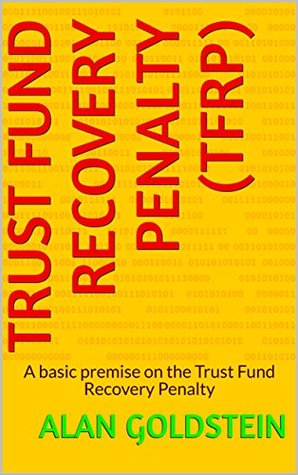This book covers a basic introduction into the Trust Fund Recovery Penalty assessed by the IRS. This book is not a defense manual or legal advise. Each Trust Fund Recovery Penalty case is different and the author highly recommends that you choose representation when fighting the IRS. The IRS has a severe penalty for employers that fail to pay employment related taxes. This
Read Online Trust Fund Recovery Penalty (TFRP): A basic premise on the Trust Fund Recovery Penalty - Alan Goldstein | PDF
Related searches:
IRS Trust Fund Recovery Penalty: Penalties for the TFRP
Trust Fund Recovery Penalty (TFRP): A basic premise on the Trust Fund Recovery Penalty
THE TRUST FUND RECOVERY PENALTY - haynes-tax-law
Claim for Refund of the Trust Fund Recovery Penalty Wagner
Trust fund recovery penalty also known as tfrp, means you a can be held personally liable for a penalty for not properly managing employment taxes of a business. This is known as the “trust fund recovery penalty” (tfrp).
The trust fund recovery penalty (tfrp) will normally not be assessed when the likelihood of successful collection is minimal. Secure form 433ba, collection information statement (cis), for individuals and/or 433bb, collection information statement for business.
An individual assessed the trust fund recovery penalty (tfrp) has the option to pay just a portion of the assessment to gain access to a court. This is different from the requirement for income taxes, which calls for payment, in full, of the tax, penalty, and interest, before a court can hear the case.
Irs trust fund recovery penalty: penalties for payroll tax liabilities congress created the trust fund recovery penalty (tfrp) as a civil penalty designed to encourage businesses to pay their federal withholding taxes, including income taxes and the employees’ share of fica, which goes toward social security and medicare, in a timely fashion.
A trust fund is a legal document created to hold assets for beneficiaries. They are often created to have more control over the process of passing assets on to heirs, and for tax purposes.
A trust fund is a legal entity that holds property for the benefit of another person, group, or organization. A trust fund is a special type of legal entity that holds property for the benefi.
The trust fund recovery penalty (tfrp) is a penalty assessed against those who have the responsibility of collecting and paying over trust fund taxes to the government and willfully evade or attempt to evade payment. Trust fund recovery cases are a niche part of tax resolution.
Office of the chief actuary frequently asked questions about the social security trust funds what are the social security trust funds? the social security trust funds are the old-age and survivors insurance (oasi) and the disability insuran.
If the irs determines the tfrp is appropriate, it is required to issue the taxpayer a letter 1153, proposed trust fund recovery penalty notification. After receipt of the letter 1153, the taxpayer has 60 days to file a written protest with the irs contesting the tfrp determination.
Generally, there is no set penalty for early withdrawal from a mutual fund. However, there are circumstances, based on when and how the mutual fund was purchased, that could result in financial consequences when the money is withdrawn.
Now what? learn about ways to move your property into it to fund the trust. A trust can hold many types of assets including real estate, life insurance policies, and individual retirement accounts.
It isn't uncommon for the terms trust fund and will to be confused with each other despite that they're not interchangeable. While some may have heard the terms, they may not understand their purposes.
Trust fund tax is money that you legally withhold from an employee’s paycheck and hold “in trust” until it’s time to pay the funds to the treasury via the electronic federal tax payment system. It consists of the income tax and the employees’ shares of medicare and social security.

Post Your Comments: